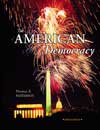Introduction Chapter's main points: Political culture is centered on core ideals-liberty, equality, self-government,
individualism, diversity, unity Politics determine how a society is governed Politics in the United States have a number of major patterns: - A highly fragmented governing system
- A high degree of pluralism
- An extraordinary emphasis on individual rights
- A pronounced separation of the political and economic spheres
Political Culture: The Core Principles of American Government The Power of Ideals Ideals are the basis of American national identity Ideals are a unifying bond in a country of immigrants (see Figure 1) Ideals define the boundaries of political action U.S. spends less on social welfare programs due to individualism American individualism stems from the country's wilderness origins Most Americans do not see caring for the able-bodied poor as a governmental responsibility Emphasis on equal opportunity, especially in educational system The Limits of Ideals People do not always live up to high ideals (slavery, segregation, discrimination against Chinese) Ideals do not always match reality because ideals have inexact meanings and often are interpreted differently (see Table 1) Despite this, ideals have strong impact on nation's politics Politics: The Process of Deciding upon Society's Goals Conflict and Consensus Conflict is rooted in scarcity of resources and differences in values Politics is a means of both settling disputes and promoting collective interests Politics is the process through which a society makes its governing decisions Government, Power, Authority, and Policy Government consists of institutions, processes, and rules All governments have capacity to raise revenues and use coercion Power is the ability of persons or institutions to control policy Authority is the recognized right to making binding decisions Governments must have power to ensure its laws are obeyed, but this power can be abused The U.S. government includes an elaborate system of checks and balances to protect against the abuse of power Policy has two interpretations: Any broad course of action undertaken by government In narrower sense, refers to specific programs or initiatives The Rules of the Political Game Democracy-the people govern, either directly or through elected officials Constitutionalism-;quot;a set of rules that restricts the lawful uses of power;quot; Capitalism-holds that the government should interfere with the economy as little as possible For example, taxes are comparatively low in the U. S. (See Figure 3) Who Governs America? Rule by the People-the majority prevails in determining public policy Rule by Groups-pluralism holds that power is wielded by diverse interests Rule by a Few-power is held by a small number of influential people or "elites" Who Governs America?-each of the above theories must be considered (See Table 2) The Concept of a Political System and The Book's Organization The American Political System Parts of system are interrelated (See Figure 4) Five Encompassing Tendencies of American Politics - Enduring cultural ideals that bond people and set political goals
- Extreme fragmentation of governing authority (checks and balances)
- A great many competing interests (nation's size and complexity)
- A strong emphasis on individual rights
- A sharp separation of the political and economic spheres
| 



 2001 A McGraw-Hill Online Learning Centre
2001 A McGraw-Hill Online Learning Centre